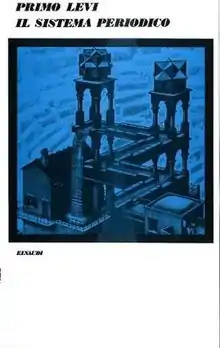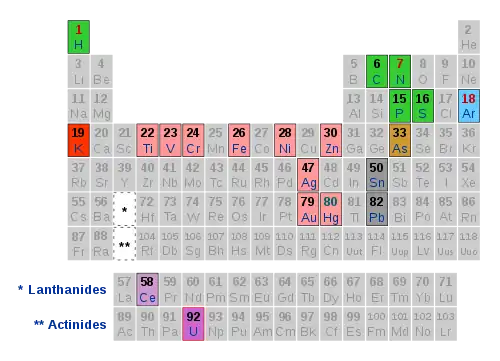The Periodic Table (short story collection)
The Periodic Table (Italian: Il sistema periodico) is a collection of short stories by Primo Levi, published in 1975, named after the periodic table in chemistry. In 2006, the Royal Institution of Great Britain named it the best science book ever.[1]
 First edition | |
| Author | Primo Levi |
|---|---|
| Original title | Il sistema periodico |
| Translator | Raymond Rosenthal |
| Cover artist | M. C. Escher |
| Country | Italy |
| Language | Italian |
| Publisher | Einaudi (Italian) Schocken Books (English) |
Publication date | 1975 |
Published in English | 1984 |
| Media type | Print (hardback & paperback) |
| Pages | 233 |
| ISBN | 0-8052-3929-4 |
| OCLC | 16468959 |

Content
The stories are autobiographical episodes of the author's experiences as a Jewish-Italian doctoral-level chemist under the Fascist regime and afterwards. They include various themes that follow a chronological sequence: his ancestry, his study of chemistry and practising the profession in wartime Italy, a pair of imaginative tales he wrote at that time,[2] and his subsequent experiences as an anti-Fascist partisan, his arrest and imprisonment, interrogation, and internment in the Fossoli di Carpi and Auschwitz camps, and postwar life as an industrial chemist. Every story, 21 in total, has the name of a chemical element and is connected to it in some way.
Chapters
- "Argon" – The infancy of the author, the community of Piedmontese Jews and their language
- "Hydrogen" – Two children experiment with electrolysis
- "Zinc" – Laboratory experiments in a university
- "Iron" – The adolescence of the author, between the racial laws and the Alps
- "Potassium" – An experience in the laboratory with unexpected results
- "Nickel" – In the chemical laboratories of a mine
- "Lead" – The narrative of a primitive metallurgist (fiction)[3]
- "Mercury" – A tale of populating a remote and desolate island (fiction)[4]
- "Phosphorus" – An experience on a job in the chemical industry
- "Gold" – A story of imprisonment
- "Cerium" – Survival in the Lager
- "Chromium" – The recovery of livered varnishes
- "Sulfur" – An experience on a job in the chemical industry (apparently fiction)
- "Titanium" – A scene of daily life (apparently fiction)
- "Arsenic" – Consultation about a sugar sample
- "Nitrogen" – Trying to manufacture cosmetics by scratching the floor of a hen-house
- "Tin" – A domestic chemical laboratory
- "Uranium" – Consultation about a piece of metal
- "Silver" – The story of some unsuitable photographic plates
- "Vanadium" – Finding a German chemist after the war
- "Carbon" – The history of a carbon atom
Bibliography
- First American edition, New York, Schocken Books, 1984
- ISBN 0-8052-3929-4 (hardcover)
- ISBN 0-8052-0811-9 (trade paperback)
- Reissues
- Random House hardcover edition, September 1996 ISBN 0-679-44722-9 (ISBN 978-0-679-44722-1)
- Knopf Publishing Group paperback edition, April 1995 ISBN 0-8052-1041-5 (ISBN 9780805210415)
Adaptations
The book was dramatised for radio by BBC Radio 4 in 2016.[5] The dramatisation was broadcast in 12 episodes, with Henry Goodman and Akbar Kurtha as Primo Levi.
Notes and references
- Randerson, James (21 October 2006). "Levi's memoir beats Darwin to win science book title". The Guardian. Retrieved 3 March 2017.
- In the chapter, Nickel, "...on some other of those long nights were born two stories of islands and freedom, the first I felt inclined to write after...liceo..."(1984 paperback, p. 73), and "Nor have the two mineral tales which I wrote then disappeared.... The reader will find them here in the succeeding pages, inserted, like a prisoner's dream of escape, between these tales of militant chemistry." (1984 paperback, p. 78)
- "One story fantasize[s] about a remote precursor of mine, a hunter of lead instead of nickel...." 1984 paperback, p. 73
- "...the other [story], ambiguous and mercurial, I had taken from a reference to the island of Tristan da Cunha that I happened to see during that period." 1984 paperback, p. 73
- "Primo Levi's The Periodic Table". www.bbc.co.uk. Retrieved 5 August 2016.
See also
 Quotations related to The Periodic Table at Wikiquote
Quotations related to The Periodic Table at Wikiquote Chemistry portal
Chemistry portal